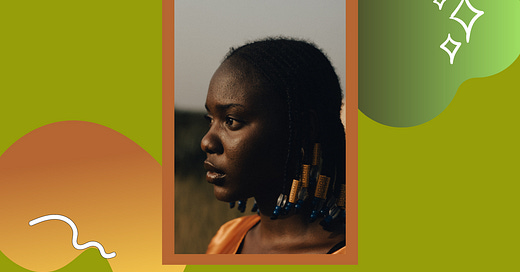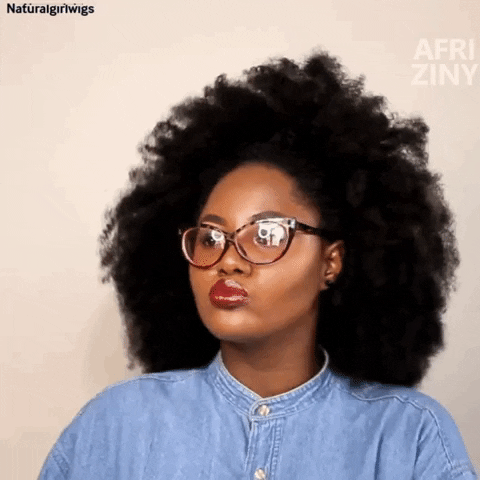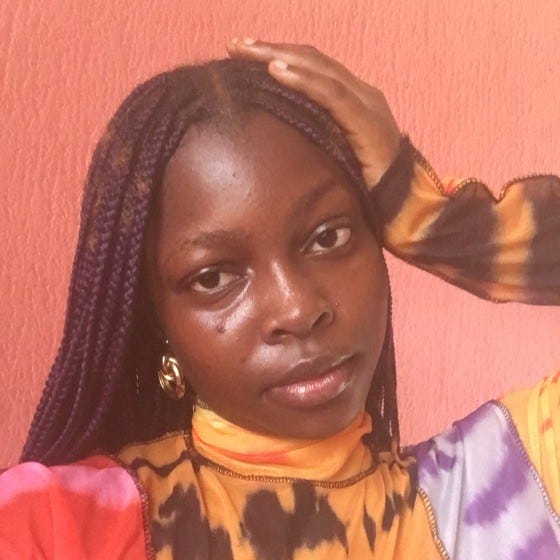Hey yall,
So, for the first time in my life: MY LEGS ARE THE SAME SHADE AS MY BODY!
Trivial, I know, but let me explain.
I’ve been putting in WORK like Rihanna to make this happen. I’ve been doing hot girl walks and hikes, basking in the sunlight whenever the temperature creeps even remotely close to 75 degrees, and reaching for dresses and skirts more often to give my legs a chance to breathe. All while being slathered up in that good SPF 50, of course—Black does crack y’all. Anyway, it’s been glorious and I’d like to thank the sun, my parent’s backyard, and this summer for consistently showing up for ya girl while she got her tan on.
Back in the day, I used to be really self-conscious about my legs and rarely showed them. It wasn’t until college that they began to make an appearance outside of my basketball uniform, but, in my mind, they were 7-8 shades lighter than my face which made me self-conscious all over again and want to cover them up. I’ve long since let go of that insecurity, but I’ve never been able to achieve a consistent Black complexion—until this summer. Actually, my legs are now darker than the rest of my body. It’s a small ting, but this somehow seems like an achievement. Not necessarily the new complexion level I just unlocked, but the present me breaking through an insecurity the younger me once held.
It feels good.
This Week’s Story
Countless women around the globe have found their spirit’s liberation in the Yoruba orisa, Osun. This week’s author, Mide Olabanji from Lagos, is one of them. As an Igbo gal, the Yoruba’s ancestral religions have always fascinated me as they’ve been able to transcend time and space with women from the streets of Lagos all the way to the favelas of Brazil building altars in Osun’s honor. Whether you believe or not, the Black woman has always been God and the story of Osun is a testament to that.
Take care,
Anayo Awuzie
EIC of Carefree Mag
I Found My Freedom At Osun’s River
by Mide Olabanji
I was 17 years old when I was accepted into University to pursue a degree in English. While getting ready for my secondary school leaving exams, I was working on a comprehension passage1. I was so captivated by the storytelling in the passage that a desire took hold of me—I felt a deep urge to understand how to use language to craft similar narratives. Despite this passion, when the opportunity to apply for university arrived, I chose to pursue a degree in law instead.
When I was younger, I watched a Korean movie where the main character was a law student who wanted to use his degree to free his wrongly-imprisoned father. I thought, “Yeah, this is cool, I’m going to be a lawyer, too!” Then I read the passage and told my family I now wanted to learn English instead. My dad was devastated but calmly explained to me that the only job I could get with an English degree is that of a teacher, and that teachers in Nigeria are not paid enough. Lawyers, on the other hand, are reputable and seem to be handsomely paid. So, law it was.
A year later, after I wasn’t accepted into the uni I applied to the previous year, my dad called me one afternoon while I was preparing to apply to another. He asked if I really was interested in studying law; “I don’t want it to be that I forced you into it,” he said. What was left unsaid is how he had taken to calling me his “D Law,” the family’s lawyer, and bragging to friends that his daughter would soon become a lawyer. If I made a good point in the middle of a discussion or argument, he’d credit it to the lawyer's insight in me. So I mustered conviction and assured him that studying law is also what I want for myself. Again, my application to study law was rejected. The next option was to try again the following year or replace law with something else and then, if I have an exceptional GPA, transfer in my second year. I took the latter, only to never make the move to transfer.
My older sibling argues that growing up, I was my mum’s favorite child. Not only do I look like what Nigerians fondly refer to as her “carbon copy,” my mother protected me like a hen. I still credit it to my early puberty that attracted hawks – predatory men – to me. The first university I applied to was in Lagos, the city I was born and grew up in. My older sister at the time was studying in Kwara, where both my parents have roots, but I couldn’t because the school wasn’t accredited to teach Law.
So the next time, I applied to Ondo State University, 8 hours from home, where I had never been prior and have no family around. Alone in my single-room apartment and, for the first time ever, I had to live by myself, sit with my thoughts and make decisions for myself.
Some months later, I went on a school excursion to the Osun Osogbo Sacred Grove and river in Osogbo, a town stationed a few hours north of Lagos. We learned how the people, who have now become indigenes of Osogbo, found relief and shelter from the drought and farming that plagued their original home at the river. Osun, the orisa and patron saint of the river, is fondly nicknamed Olomoyoyo, an onomatopoeic expression for “a person liked or surrounded by children.” In general Yoruba religion, Osun is associated with bodies of water and is regarded as the god of fertility, femininity, beauty, love, and divinity. The excursion site holds multiple carvings of Osun, and people—particularly women—who struggle to have children pray at the feet of the carvings for Osun to bless them with children.
As unclean as the river looked, one of the lecturers that accompanied us on the trip squatted down to scoop up the water and drink some of it. He explained that the water is believed to carry healing properties. I have never been religious, but the difference between my Islamic upbringing where women are not allowed to lead prayers and Yoruba spirituality where women, like Osun, are powerful Orisas who are worshiped was eye-opening, refreshing, and validating.
In the Yoruba religion, Orisas are Olodumare’s assistants on Earth who play a vital role in the continued existence of the world and the people in it. Resultantly, people often seek their intervention instead of going directly to Olodumare for help or guidance. Some people say Orisa means god, but the literal meaning is “the one (whose) head selected,” depicting the importance Yoruba spirituality attaches to the head, similar to the concept of “chi” in Igbo cosmology.
The concept of Ori (head) in Yoruba religion is similar to that of destiny. When a person is successful, we say that they selected a good head (or destiny); when a person is generally unlucky, we assert that they didn’t choose a good head (destiny). Unlike destiny which is predetermined, the Yorubas believe that even after being born and unsatisfied with your head, you can use your own hand, actions, to reset it. It is not uncommon to see a Yoruba person hold their head and pray to it, because the ultimate alignment anyone can ever have, according to Yoruba culture, is with their heads.
At the Osun river, there is a sculpted imitation of a marketplace which also features the carved images of some other Orisas, like Sango who is famous for bellowing fire from his mouth. When another student expressed their shock at Orisas, powerful beings, seemingly engaged in regular market transactions, our tour guide clarified that many Orisas were community members like everyone else, only that their heads selected them for greatness. While on earth, they had special powers that are believed to transcend mortality, so even after they have physically left, they are still worshiped and respected. This peculiarity of Orisas made me realize that, even as a regular human, I can be so much more, as long as I and my Ori are in alignment.
I am in my final semester and often think about all the ways my life could have gone differently if I got accepted to study law. As students in English departments of African universities, our focus is less on English literature in itself but more on African and Black pieces of literature written in the English language. In my third year, we were taught about Négritude and its contribution to Black literature and philosophy. When I was making notes, I ran into the definition of the movement by one of its pioneers, Aimé Césaire, and a realization immediately dawned on me — that the excursion trip of two years earlier to Osogbo has changed my life in many little ways and made me the person I now am.
Césaire defined the intellectual movement as “the simple recognition of the fact that one is black, the acceptance of this fact and of our destiny as blacks, of our history and culture.” The statement transported me to that brown grove of Osun’s, because that was when I staunchly accepted being Black, Nigerian—Yoruba. It was when I got in touch with the core part of myself, when I accepted my Blackness and everything it comes with, and when I began to make my identity out of it.
Similar to what the Négritude movement of the 1930s set out to do, the trip reaffirmed my Black, African, and Yoruba identity, correcting the Eurocentric notions that my ancestors were boring and insignificant people. It made me realize that, just by being born, I am a special person and that all I need is within me. It has also translated to the way I wear my Black skin and hair. I now have an arm tattoo “Orisa” to that respect which I carry as an affirmation, in case I ever forget that all I need in life is for my Ori and I to choose ourselves and be in alignment.
In June, an Olorisa and Egbe festival that was slated to be held in Ilorin, Kwara state was met with resistance and violent threats by some Yoruba Muslims and Alfas in the state. Their argument was that Ilorin is an emirate, a land led by a Muslim (usually Arab) military commander or local chief. Not only is this ahistorical – Ilorin literally means “the act of grinding metals (to make weapons)” because it was the military base of the Oyo Empire pre-colonization, Africans demonizing a Black religion and prohibiting its practice in the most populous African country is a manifestation of internalized racism. I am an Ilorin woman and the person I am today is indebted to Osun’s welcome on that random excursion in 2019. I hope I live long enough to witness the day Africans stop demeaning and impeding traditional religions in favor of imported ones.
From plastic pollution to destructive mining activities, it also saddens me that Osun’s river is becoming increasingly unhealthy by the day. Besides the sentimental attachment I have to it, it is an important part of Yoruba cultural history and future that must be preserved and treasured by the state and federal government.
Mide Olabanji is a content and creative writer who has written for AMAKA Studio, The 21 Mag, Black Ballad, and numerous other publications. My work covers culture, lifestyle, beauty, and fashion. You can read more of her work here.
Enjoyed this week's storyletter? Tap the heart & share it! 😍
Share on Twitter | Share on Facebook | Share via email | View past stories
A comprehension passage is a short story or essay in English textbooks of secondary school students. It is usually followed by questions that test students' understanding of the story and replacement of certain words (in the forms of synonyms and antonyms) in the story.









"ankh charms on gold chains, with my Oshun energy", realizing many Nigerians(Africans) had a problem with this line and the entire Black Parade song because it is tagged "fetish", I knew there was a significant problem in our orientation. I love you for being a voice for reformation, while I can only but whisper these things!
Wow, young folks like you reminds me that one day, NIgeria will recognize itself to be one instead of the tribalism it is marred with. Your head is in place. Good job!